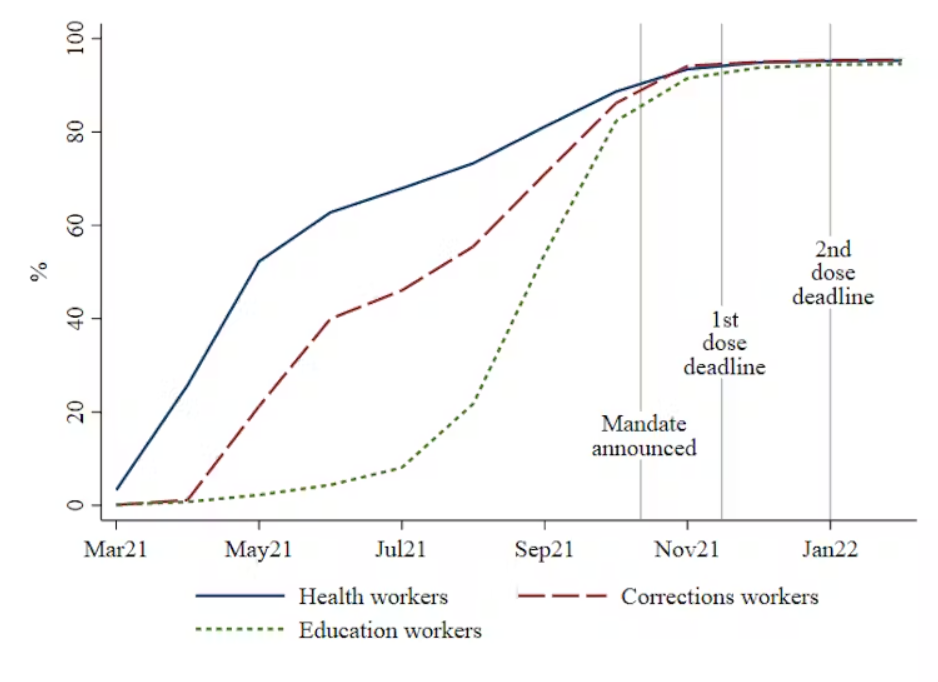Table of Contents
Jan Dewar
Head of Nursing
Denise Wilson
Associate Dean Maori Advancement | Professor Maori Health
Gail Pacheco
Professor of Economics, Director of the NZ Work Research Institute
Lisa Meehan
Deputy Director, NZ Work Research Institute
Auckland University of Technology
During the height of the COVID-19 pandemic, policy was being made in crisis management mode. Decisions had to be made faster than usual, and there was limited ability to undertake wider consultation and impact analysis.
Now the worst of the pandemic is over, we have the luxury of being able to reflect on what worked well and what didn’t.
One of the more controversial policies implemented during the height of the pandemic was the vaccine mandates. Thousands of workers across a range of professions had to get vaccinated to keep their jobs.
This mandate presented a trade-off between public health considerations and the right of individuals to refuse medical treatment and earn a living in their chosen profession.
Our research looked at whether these vaccine mandates increased COVID-19 vaccination rates among these workers, and what their employment, earnings and workplace experiences were.
The stated purpose of the mandates was to increase vaccination rates among these workers to ensure the continuity of public services.
In reality, the mandates had limited effect on increasing vaccine uptake. But they had a substantive negative effect on the employment, earnings and wellbeing of unvaccinated health workers.
The importance of choice
Vaccination rates among healthcare, education and corrections workers were already high when the government announced the mandates in October 2021.
Almost 90% of healthcare workers and 86% of corrections workers had already received two doses of the vaccine. The share among education workers was somewhat lower (82%), but they also did not have early access to the vaccine. There were only six weeks between the vaccine becoming available to everyone over 12 years and the mandates being announced.
While vaccination rates among these mandated workers did increase after the mandates were announced, the data shows a continuation of an upward trend rather than a jump in uptake.

It won’t surprise anyone that people don’t like being told what to do. And this appears to have some bearing on mandatory vaccine uptake.
One German survey found just over 3% of people said they would not want the COVID-19 vaccination if it was voluntary. But more than 16% said they would not want to get vaccinated if it was mandatory.
A consequence of vaccine mandates is that they can erode trust in government and provoke more resistance. This erosion of trust could potentially strengthen anti-vaccination sentiment generally and reduce uptake, not just of COVID-19 vaccinations, but also other vaccines.
This outcome is especially concerning given research has found New Zealand’s routine childhood immunisation rates have decreased since the pandemic.
Earnings took a hit
In addition to not causing a noticeable increase in vaccination rates, the mandates also had negative consequences for the employment and earnings of unvaccinated health workers.
Their employment rate fell by 15% and their earnings fell by 19%, compared with vaccinated health workers and those not subject to the mandates.
Even after the health worker mandates were lifted in September 2022, the employment and earnings of unvaccinated workers never fully recovered.
This exacerbated existing health worker shortages. Closed borders and a global shortage of healthcare workers meant fewer moved into the health sector compared with the number leaving.
The trauma of being branded ‘anti-vax’
The effect of the mandates on health workers also went beyond financial consequences.
Affected health workers talked to us about the loss and ongoing trauma they have experienced. Those opposed to mandates are often incorrectly labelled as “anti-vaxxers”, or even conspiracy theorists.
All health workers we spoke to were pro-vaccination, but had legitimate reasons for not completing, or struggling to complete, the required vaccinations. They had researched the vaccine and made informed decisions based on their circumstances.
Some health workers pointed out that the case for mandates was not strong based on available evidence. While the vaccine reduces symptom severity, its ability to prevent transmission is currently limited.
As one health worker said:
I looked at the Australian data and couldn’t see the logic of me potentially being exposed to another vaccine where my potential benefit was so low […] the evidence wasn’t really strong.
Some workers had health conditions that put them at elevated risk from the vaccine. Or they had a history of adverse reactions to vaccines. But the mandates meant they either had to get vaccinated, sometimes against their doctors’ advice, or lose their jobs. While some medical exemptions were available, the threshold for these was very high.
In addition, even those with medical exemptions faced stigma. One health worker who got an exemption after suffering a stroke following their vaccination, described people’s reaction upon showing them the exemption.
That look on people’s faces, it was disgust […] it was really, really awful.
As another health worker explained:
We’re supposed to be a caring profession. Nothing about this is caring […] Due to no fault of my own, I have now been labelled an anti-vaxxer and anti-science, and in some people’s opinion, not worthy of calling myself a nurse. This hurts me immensely. This is what mandates have done. There is no room for individual circumstances.
The people we spoke with said they lost their sense of control, and it eroded their trust in the health system and government.
The risk of mandates
What does this tell us about the use of vaccine mandates during future pandemics?
In the context of high voluntary compliance, mandates should be used judiciously. Mandating something is not always the most effective way to get people to do something for the greater good.
During the COVID-19 pandemic, a strong motivator for vaccination was the “feel-good” factor of knowing you were protecting yourself and others.
Ironically, the increase in distrust that resulted from the use of mandates in the COVID-19 pandemic may actually lower voluntary vaccine uptake in future pandemics.
As one health worker summed it up:
Someone who’s been vaccinated badly, the trauma of that – it’s not just them, it’s their entire social circle, it’s their entire whanau. You’re seeding distrust in the health system, not just for COVID vaccinations, but the whole system, everything to do with medicine and the whole immunisation programme […] if there’s a policy that’s as big as a mandate for a whole population or health professionals, you really need to think about what are the unintended consequences.
This article is republished from The Conversation under a Creative Commons license. Read the original article.









